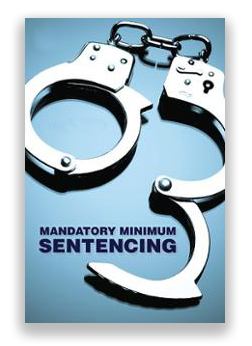We post news and comment on federal criminal justice issues, focused primarily on trial and post-conviction matters, legislative initiatives, and sentencing issues.

NEW STUDIES SLAM GUILTY PLEA PRESSURE AND 851 ENHANCEMENTS
Two studies released last week documented affronts to justice from pressure to plead guilty, and “851 enhancements” that dramatically increase mandatory minimum sentences.
 A troubling study released last week by the National Association of Criminal Defense Lawyers found “ample evidence that federal criminal defendants are being coerced to plead guilty because the penalty for exercising their constitutional rights is simply too high to risk. This ‘trial penalty’ results from the discrepancy between the sentence the prosecutor is willing to offer in exchange for a guilty plea and the sentence that would be imposed after a trial.
A troubling study released last week by the National Association of Criminal Defense Lawyers found “ample evidence that federal criminal defendants are being coerced to plead guilty because the penalty for exercising their constitutional rights is simply too high to risk. This ‘trial penalty’ results from the discrepancy between the sentence the prosecutor is willing to offer in exchange for a guilty plea and the sentence that would be imposed after a trial.
The NACDL study documents the corrosive effect of the trial penalty on the criminal justice system, resulting from uncontrolled prosecutorial charging discretion, mandatory minimum sentencing statutes, and the Guidelines. The government’s capacity to process large caseloads without hearings or trials has resulted in an exponential increase in incarceration.
The system’s pressures on defendants to plead guilty causes innocent people to plead guilty. Of 354 defendants exonerated by DNA analysis in the last six years, 11% had pled guilty to the crime they did not commit.
The Report recommends wholesale changes in the Guidelines to exclude relevant conduct, to permit the court to award a third acceptance-of-responsibility point even without government motion, and to prevent application of an obstruction-of-justice enhancement simply because the defendant testifies. It also called for substantial revision of mandatory minimums for sentences.
 Ironically, the 9th Circuit reversed a sentence last week where it said the judge seemed to penalize the defendant for his decision to assert “protected Sixth Amendment right” to go to trial. The district court had emphasized the defendant’s “decision to go to trial” five separate times during the sentencing hearing, and just before imposing the sentence, declared to the defendant: “You decided to roll the dice, and it came up snake eyes. You didn’t think she’d testify, and she did. You went – you wanted to go to trial, so you went to trial. And Probation rightly recommends 327 months for that.”
Ironically, the 9th Circuit reversed a sentence last week where it said the judge seemed to penalize the defendant for his decision to assert “protected Sixth Amendment right” to go to trial. The district court had emphasized the defendant’s “decision to go to trial” five separate times during the sentencing hearing, and just before imposing the sentence, declared to the defendant: “You decided to roll the dice, and it came up snake eyes. You didn’t think she’d testify, and she did. You went – you wanted to go to trial, so you went to trial. And Probation rightly recommends 327 months for that.”
The 9th Circuit held that “the district court’s statements run headlong into our precedent that a judge cannot rely upon the fact that a defendant refuses to plead guilty and insists on his right to trial as the basis for denying an acceptance of responsibility adjustment…” The Circuit complained the record did not specify which if any 18 USC 3553 sentencing factors the judge considered, “or whether it considered any facts at all beyond Hernandez’s decision to exercise his constitutional rights.” On this record, the Circuit said, “it is impossible to avoid the centrality of the comments about Hernandez’s decision to go to trial.”
 Meanwhile, the Sentencing Commission issued a surprising report on government use of so-called 851 enhancements to drug trafficking sentences. Under 21 USC 841(b), mandatory minimum sentences are dramatically increased if the defendant has prior serious drug cases. The government triggers the higher mandatory minimum by filing a notice of enhanced penalty under 21 USC 851, which then requires the court to apply the higher mandatory minimum.
Meanwhile, the Sentencing Commission issued a surprising report on government use of so-called 851 enhancements to drug trafficking sentences. Under 21 USC 841(b), mandatory minimum sentences are dramatically increased if the defendant has prior serious drug cases. The government triggers the higher mandatory minimum by filing a notice of enhanced penalty under 21 USC 851, which then requires the court to apply the higher mandatory minimum.
The report found that the government filed 851 enhancements in only 12.3% of eligible cases in 2016. The enhancement seems to be used mostly as leverage to force cooperation. After accounting for cases in which the notice was withdrawn, only 39% of eligible defendants ultimately got the enhanced sentence.
The rate at which 851 enhancements are filed or withdrawn varies widely among districts. In most districts in fiscal year 2016, at least 25% of all drug trafficking defendants were eligible for an 851 enhancement. In five districts, 851 enhancements were filed against more than 50% of eligible drug trafficking offenders; in 19 districts, no 851 enhancements were filed at all.
Defendants against whom an 851 information was filed received an average sentence that was 61 months longer than eligible defendants against whom the information was not filed. Black offenders constituted 51.2% of offenders against whom the government filed an information seeking an 851 enhancement, followed by white offenders (24.3%) and Hispanic offenders (22.5%).
NACDL, The Trial Penalty: The Sixth Amendment Right to Trial on the Verge of Extinction and How to Save It (July 9, 2018)
U.S. Sentencing Commission, Application and Impact of 21 U.S.C. § 851: Enhanced Penalties for Federal Drug Trafficking Offenders (July 11, 2018)
United States v. Hernandez, Case No. 13-10428 (9th Cir. July 10, 2018)
– Thomas L. Root

